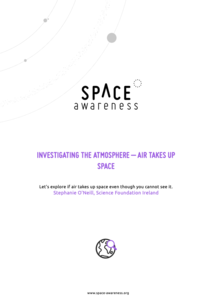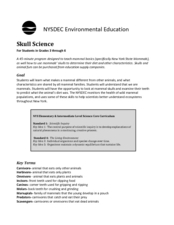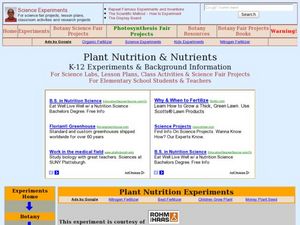ReadWriteThink
Webcams in the Classroom: Animal Inquiry and Observation
Boost observational skills with an inquiry-based lesson plan that takes scholars on a virtual field trip. With help from webcams, learners observe animals in a zoo or aquarium. Observations go into a journal and a discussion is held to...
National Science Teachers Association
Hop into Action
Young scientists find out what makes amphibians such unique and interesting animals in this simple life science lesson. After looking at pictures and discussing the characteristics of amphibians, learners complete a series...
Space Awareness
Investigating the Atmosphere - Air Takes Up Space
How do you know there is air? Can you see it, smell it, feel it? To begin the investigation, learners watch a video and discuss what they know about air and the atmosphere. Then, they participate in five different hands-on, inquiry-based...
Berkshire Museum
Meet a Naturalist: Researching, Writing, Interviewing
Young scholars reach out into the community and learn about different environmental science careers in this inquiry-based instructional activity. Beginning with a short research assignment, children gain background knowledge about...
Curated OER
Skull Science
What can your class learn from a skull? With proper facilitation, they can learn about diet, physical adaptations, special differences, and even the environment. Pupils will examine a series of mammal skulls and pelts to help them...
Space Awareness
History of the Universe
Your pupils may believe that you and their parents are the oldest things in the universe, but surprise! There are elements of the universe that are even older. Elementary scientists create a class timeline to demonstrate the...
Curated OER
A Frog's Life Story
Young scholars investigate the lives of frogs by completing several worksheets. In this biology lesson, students discover the life cycle of a frog from tadpole to death. Young scholars complete frog life cycle puzzle as well...
Curated OER
Inquiry-based Investigations into Pond Water Microorganisms
Learners become familiar with common microorganisms and experience exploring the microbial world.
Polar Trec
Animal Monitoring Introduction
Not only do mealworms taste great, they are also great for classroom science lessons. In pairs, young scientists observe and record what they see as they check out what their mealworms are doing from minute to minute. Each minute...
Curated OER
Non-Compressibility of Water
Students will observe a property of water. For this inquiry-based properties of air lesson, students observe how a change in water pressure impacts the positioning of an eye-dropper in the water container and they make hypotheses about...
Curated OER
Food & Science - How Healthy is Your Diet?
Learners experiment with various foods to determine fat and starch content. They rub jam, peanut butter, bananas, and other foods in a small circle on a piece of paper, and observe the results. If there is a high fat content in the...
NASA
Let's Investigate Mars
Take your science class on a hypothetical field trip to Mars with an engaging astronomy instructional activity. After first learning about NASA's Mars rover missions, young scientists plan their own...
Curated OER
Where are Koalas on the Food Chain?
Take a field trip to observe Koalas, absolutely! Budding scientists become familiar with the Koala's position in the food chain. They answer questions based on what they see and draw a food chain explaining the Koalas position. Tip: A...
Curated OER
Simple Machines IV - Levers
The lever is an everyday simple machine. Youngsters learn the principles of levers and explore their many uses. Groups of pupils perform a simple lab where they lift objects with a fulcrum while placing the load in a variety of...
Curated OER
Invertebrate Phyla
Young scholars explore the invertebrate phyla. They discuss the characteristics of the invertebrate Phyla in the Kingdom Animal. Students classify organisms into Phyla based on their characteristics. They distinguish radial symmetry,...
Curated OER
Termitology
Students engage in an inquiry-based study of the ecology of termites. Through hands-on investigations, they explore the life cycle of termites, the termite's role in the food web, and the unique social structure of termite colonies.
Curated OER
Properties of Soil
Fourth graders conduct investigations to test different types of soil from different regions of Texas. They make comparisons and identify the characteristics of the soil. The end product of the inquiry is a student report.
Curated OER
Introduction to Ocean Grazers
Young scholars explore biology by creating a poster with classmates. In this oceanography lesson, students identify the importance of coral reefs to the ocean's ecology and examine a food web of ocean animals. Young scholars define a...
Curated OER
Plant Nutrition and Nutrients
Students observe seeds growth and examine the different parts of the seedling. For this biology lesson, students compare the growth of seeds planted in soil and in hydroponics. They record their observations in their science journal and...
Curated OER
Boston Harbor Cruise: A Shoreline Survey
The students take a harbor cruise, photograph, and draw shore line features attending to evidence of human impact/consequences, and its cost on marine/land animal habitats vegetation, weather patterns, signs of erosion, and the water...
Curated OER
Hurricanes and Tornadoes (Grade 4-8)
Learners investigate the concepts of hurricanes and violent weather conditions. In this violent weather lesson, students access an Internet site and watch a video about how air masses behave, how a tornado forms, how hurricanes form, and...
Curated OER
The Froggy Page
Learners investigate the cycle of life by observing tadpoles. In this biology lesson, students utilize the Internet to read stories, observe pictures, and listen to sounds of frogs. Learners create a poster board collage...
Curated OER
Invent on the Spot
The best inventions come from a problem that needs to be solved! Given a container with holes in...
Curated OER
Desalination: Creating a Solar Still
To better understand how solar power can aid in creating desalinated drinking water, the class creates a model still. They will build a model of a solar still, make observations, and discuss how the process works. While the idea behind...

























